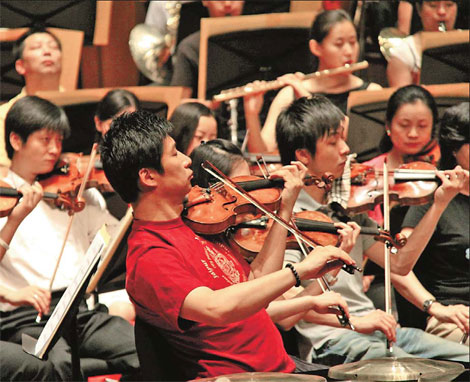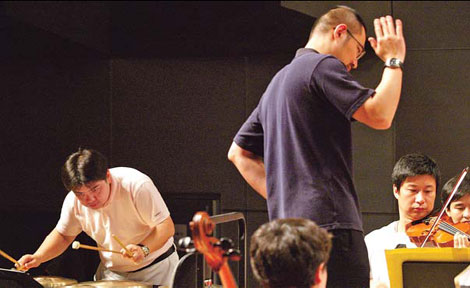Life and Leisure
In perfect tune with one another
By Chen Jie (China Daily)
Updated: 2010-08-24 11:12
 |
Large Medium Small |

Musicians from Taiwan and the mainland join hands to present concerts around the country this summer. Photos provided to China Daily |
A series of concerts show the Straits Philharmonic Orchestra is not only musically important but also a bridge across the Taiwan Straits. Chen Jie reports
The Straits Philharmonic Orchestra (SPO) toured both sides of the Taiwan Straits last year, did the same this summer and expect to do so again in the future. The 36 instrumentalists from Taiwan and 57 from the mainland arrived in Beijing last month for a two-week tour under the baton of Taiwan conductor Chien Wen-pin.
After five days of intense rehearsals at the Central Conservatory of Music, they gave their first concert at the National Center for the Performing Arts on July 26.
The program consisted of Stravinsky's Fire Bird, Gliere's Vocal Concerto, mainland composer Guo Wenjing's The Rite of Mountains and Taiwan composer Liu Shueh-shuan's Stone Lion.
Liu's Stone Lion was inspired by the stone lions at an old temple in Taiwan's Sanxia town. Guo's piece pays tribute to the victims of the Wenchuan earthquake.
Beijing's picky concertgoers appreciated the music throughout and rose to sing the encore piece, the Taiwan pop song The Moon Represents My Heart, by Teresa Teng (1953-1995).
There was similar applause at the Chengdu Jiaozi Concert Hall on July 27, Shenzhen Concert Hall on July 30, Taipei Concert Hall on Aug 1 and at the Taichung Chung-Hsin Concert Hall on Aug 2.
"When we discussed the encore piece last year, many orchestra members wanted to play the song. The enthusiastic response of the audience showed it was a perfect choice so we decided to continue this year and in future concerts," says Guo Shan, chairwoman of the China Symphony Development Foundation, which is the organizer of SPO.
"It's hard to conduct an orchestra when the members have gathered just five days before the concert. They did not know one another's habits, and I had no idea what the sound would be like," Chien says.
"But everybody just wanted to do well, and we got through all the pieces incredibly fast, like a well-disciplined, experienced orchestra."
Although the musicians from both sides of the Straits only work together on a temporary basis, there were many connections, such as teachers or classmates, that made communication smoother.
Oboe player Lee Ming-I from Taiwan National Symphony Orchestra studied at the Academy of Music Hanns Eisler in Berlin where mainland percussionist Li Biao teaches. Zhang Le, the concertmaster of Shenzhen Symphony Orchestra, and several Taiwan violinists were schoolmates at Juilliard School in New York.

The Straits Philharmonic Orchestra rehearses for its summer tour under the watchful eyes of Taiwan conductor Chien Wen-pin. |
"I played in Taiwan with the Shenzhen Symphony Orchestra 10 years ago, but it was a totally different experience this time, sitting next to a Taiwan flutist and sharing one copy of the score," flutist Zhang Bing says.
"We bring different disciplines and styles to the orchestra, but after rehearsals we play with one sound. During the break, we discuss the music as well as each other's playing habits and in the two-week tour we've developed a unique friendship," Zhang Bing says.
Early last year, Taiwan composer Hsu Po-yun suggested a mainland-Taiwan orchestra be formed in a meeting with Guo.
"Hsu's idea got a positive response among many members of the Foundation. Taiwan and the mainland have developed a closer and better relationship, especially in terms of trade and economy, and Taiwan pop stars have millions of fans on the mainland. What we can do, maybe, is provide an opportunity for musicians from both sides to share the same stage," Guo says.
Soon after that meeting, the Foundation gathered 59 instrumentalists from 21 mainland orchestras and 33 musicians from 10 Taiwan orchestras to form the SPO. Chinese conductor Lu Jia served as the first music director of SPO. Under his baton, SPO toured Beijing, Shanghai, Shenzhen, Taipei and Kaohsiung in July and August last year.
Lien Chan, the Kuomintang's honorary chairman, attended the concert in Beijing, while Taiwan leader Ma Ying-jeou went to the Taipei concert. Both were full of praise for the SPO.
Conductors from Taiwan and the mainland rotate as SPO's music director and this year the baton went to Chien, resident conductor of the Deutsche Oper am Rhein.
The 43-year-old says he admires the Foundation's vision and effort to form the orchestra. He says he had planned such an exchange program when he was appointed music director of the Taiwan National Symphony Orchestra in 2001, but for all kinds of reasons, the idea was not realized.
Besides vision and courage, money is always another factor behind the project. Last year, Hsu's International New Aspect Culture and Education Foundation paid most of the funds for the project, and this year, the patron is the Faith, Hope & Love Foundation of VIA Technologies.
It is Guo's talent in music and leadership that has made China Symphony Development Foundation an important factor in promoting classical music in China.
Initiated by Guo, the Foundation formed a China Symphony Orchestras League two years ago and now 41 orchestras have joined the League, including one from Tibet and one from Xinjiang. Every year, the Foundation has sponsored these orchestras and musicians to do charity concerts on campuses and in communities.
Last year, Guo was also elected to chair the Alliance of Asia-Pacific Region Orchestras. In November, the organization will gather the leading musicians in the Asia-Pacific area to give a concert at the UN's headquarters in New York during the 2010 UN Climate Change Conference to promote environmental protection.
"When I worked as vice-president of the China National Symphony Orchestra, I focused on developing the orchestra, finding talented instrumentalists, conductors and fund to compete with other orchestras," Guo says.
"Now I've realized it's a nonsense competition. Music is such a great language that we should use it to do some more meaningful, such as charity and educations."